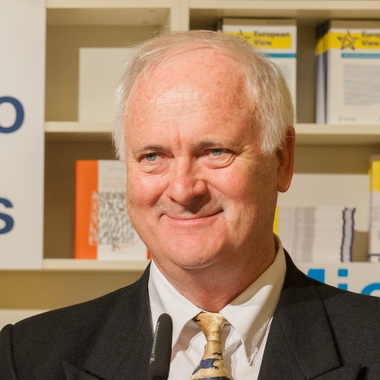Why I believe the UK should stay in the EU
02 June 2016
THE EU IS A VOLUNTARY UNION
The fact that the British voters are free to have a referendum, and free to decide to leave the European Union shows that the European Union is a voluntary Union.
It is not an Empire, which something a country would not be free to leave.
Nor is it a Federal Union like the United States, which does not permit its member states to leave either.
The EU’s voluntary character is one of the reasons why a number of states are still looking to join the EU.
THE FIRST TIME IN 60 YEARS ANY COUNTRY HAS CONSIDERED LEAVING
The 23rd of June 2016 will, however, be the first time in the EU’s 60 year history, that any state has contemplated leaving.
This is a serious matter not just for Britain, but for all the countries of the EU.
So British voters, acting as a citizen legislators on 23 June, ought to think of the risks, that a British decision to leave might create for neighbouring countries in the EU, like Ireland. Voters here in Lancashire need to think about the consequences for peace in Ireland of the deepening of the border in Ireland that would flow from a Brexit decision on 23 June.
They also should consider the risk that Britain deciding to leave would create a precedent that would weaken the bonds that hold the remaining 27 countries together. The Parliament in Westminster has passed to voters the responsibility for deciding if a possible breakup of the EU would really be good for Britain, and for Europe too. It is a big responsibility.
STABILITY IN EUROPE HAS ALWAYS BEEN IMPORTANT TO BRITAIN
Stability in Europe has been a long term British goal.
Edmund Burke in the 1790’s favoured a Commonwealth of Europe.
Castlereagh worked for a Concert of Europe, with regular Summit meetings like the EU now has, after the end of the Napoleonic Wars.
Winston Churchill, in 1930,advocated a United States of Europe.
These statesmen did not advocate these ideas out of some sort of dewy eyed sentimentalism. No, they had a hard headed appreciation of the fact that stability on the continent meant greater security for Britain, and they made their suggestions to achieve that end.
Now it is British voters, not British statesmen, who must decide what is best for Europe,
+ a Union with Britain on the inside, or
+ a fractured Union, which Britain has left of its own free will.
BREXIT COULD DOUBLE THE REGULATORY BURDEN
We hear much about EU Regulations and the burdens they impose. But even if Britain left the EU, it would still have regulations of its own on things like the environment, financial services and product safety.
In fact, to the extent that a Britain that had left the EU wanted to sell goods or services to Europe, it would have to comply with TWO sets of regulations,
+ British regulations for the British market, and
+ EU regulations for the EU market, including Ireland.
Arguably the duplicated post Brexit regulatory burden on British business would be greater than the present one.
A UK/EU TRADE DEAL COULD TAKE YEARS TO NEGOTIATE
Some believe that the UK could leave the EU, and then quickly negotiate a free trade agreement which would allow British firms to go on selling in Ireland and the other EU countries.
I am sure an agreement of some kind could eventually be worked out, but it would not be quick.
Switzerland negotiated trade agreements with the EU, but that took 9 years.
Canada negotiated a Free Trade agreement too, but that took 7 years.
The British Agreement would be much more complicated than either of these, because it would involve new issues like financial services, and freedom of movement ,and access to health services, for example for Britons in Spain. It would have to cover agriculture.
Even with maximum goodwill from the European Commission, a post Brexit EU trade agreement with Britain would become prey to the domestic politics of the 27 remaining EU countries, each of whom would have their own axes to grind.
There would be a lot of uncertainty, over a long period.
STAY IN, AND MAKE EU BETTER
I believe British people should accept that entities like the EU, which provide a structure, within which the forces of globalisation, can be governed politically are essential, if the prosperity that flows from globalisation is to be shared fairly.
Rather than leave, Britons should consider how they can make the EU better than it is, and there is plenty of scope for that.
[Speech by John Bruton, former Taoiseach of Ireland, in Stonyhurst College, near Clitheroe in Lancashire on Sunday 29 May]
ENJOYING THIS CONTENT
